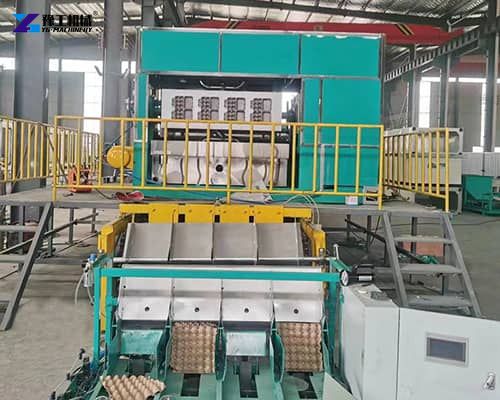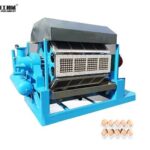Egg tray making machine is a specialized industrial device designed to produce molded pulp packaging products, primarily egg trays, using recycled paper as raw material. The process involves pulping waste paper, shaping it into specific molds, drying the formed products, and packaging them for distribution. These machines vary in size, automation level, and output capacity, catering to small-scale operations and large industrial facilities alike. The core objective of this machinery is to convert low-cost, recyclable materials into functional packaging that protects fragile items like eggs, fruits, and electronics during transportation. If you are looking for this machine, welcome to contact us freely.
How Does An Egg Tray Making Machine Work?
- Raw Material Preparation
Waste Paper Collection: Gather recycled paper, cardboard, or agricultural waste.
Pulping: The paper is mixed with water in a hydra pulper, creating a uniform slurry. - Molding Process
The pulp is transferred to a molding machine, where it is pressed into tray-shaped molds.
Vacuum pumps remove excess water, ensuring the trays retain their shape. - Drying
Trays move to a drying tunnel, or natural air, evaporates residual moisture. - Finishing and Stacking
Dried trays are trimmed, inspected, and stacked automatically for packaging.
Advantages Of Investing In An Egg Tray Manufacturing Machine
Eco-Friendliness
By recycling paper waste, the egg tray making machine reduces landfill burden and deforestation. The biodegradable end-products decompose naturally, unlike plastic alternatives.
Durability and Customization
Trays can be tailored in size, shape, and thickness to meet client specifications.
Some Considerations When Purchasing An Egg Tray Production Machine
Production Capacity: Match output (trays/hour) with your target market’s demands.
Automation Level: Balance upfront costs with long-term labor savings.
Energy Consumption: Opt for egg tray making machines with solar-compatible drying systems to cut operational expenses.
Supplier Reputation: Choose manufacturers with proven expertise, after-sales support, and warranty offerings.
Raw Material Availability: Ensure consistent access to waste paper in your region.



